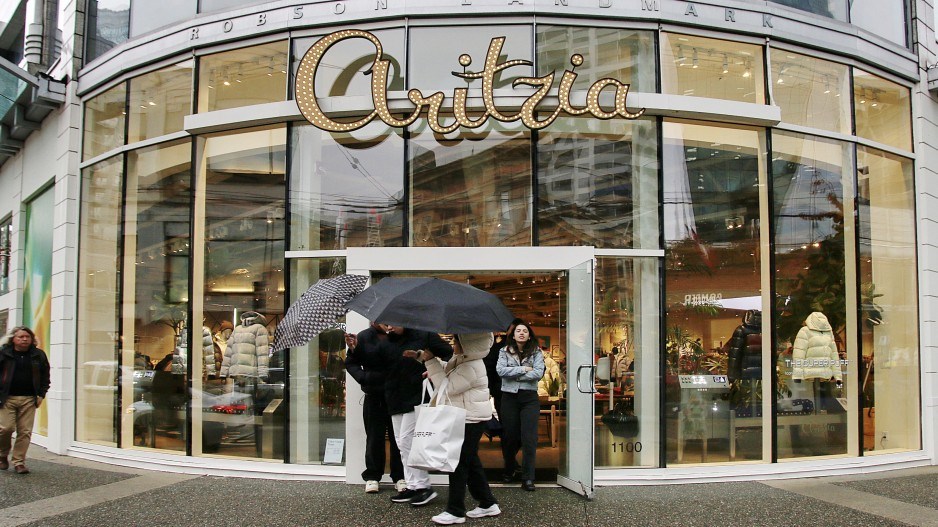Vancouver fashion retailer Aritzia Inc.'s (TSX:ATZ) shares fell in value by almost 24 per cent today, following the company's disappointing earnings report yesterday.
The company's share price is now down by more than half since October, while broader stock markets have rallied. October was also just before Aritzia chair Brian Hill sold $70 million worth of shares to diversify assets and get cash for philanthropy.
Retail analysts and investment analysts say that the company's declining profit margin and slowing sales growth is an indication that the consumer is shifting spending toward essential items and away from discretionary goods, such as clothing.
The mid-market retailer yesterday said that its quarterly profit fell by nearly half, to $17.5 million from $33.3 million in the same quarter in 2022. Its net revenue continued to increase, to $462.7 million, up 13.4 per cent from $407.9 million in the same quarter last year. Many analysts had expected higher sales, however.
Aritzia also lowered its current-year outlook for sales and gross profit margin.The company expects revenue to increase by between two and seven per cent this year, down from its previous forecast of between 10 and 14 per cent.
Investors clearly expected better results, given the stock market reaction, Murray Leith, executive vice-president and director of investment research at Odlum Brown told BIV this morning.
Leith last week mentioned Aritzia as a company that he saw as underperforming, with slowing sales. Still, he was surprised to see the extent of the market downturn today and suggested that the decline could have been in part because of "blow-out" markdowns on inventory.
Aritzia CEO Jennifer Wong and CFO Todd Ingledew yesterday avoided directly saying that their company discounted or marked down a lot of items in their first quarter, which ended May 28.
Ingledew chalked up the profit decline on a range of things, including what he called "normalized markdowns."
He also listed higher product costs as well as "temporary warehousing costs and preopening lease amortization for flagship boutiques, and our new distribution center."
Aritzia plans to open a new distribution centre in the Greater Toronto Area in August to serve the eastern half of North America.
Multiple times Ingledew and Wong said they expected future quarters to have "normalized" promotional activity.
"We’re still expecting that our year-over-year growth will more closely align with sales trends by the end of the second quarter and it doesn’t include elevated promotional cadence," Ingledew said on the company's conference call. "Although we will be selling through at a higher digital, higher markdown rate than last year due to the low levels last year."
Leith and Retail Insider Media owner Craig Patterson said Aritzia's disappointing sales and profit data reflects the consumer trend of shifting spending to essential items and away from discretionary goods. Inflation and Bank of Canada interest-rate hikes have been fuelling this trend, they said.
Executives at much larger retailers have said they face this trend.
Amazon.com Inc. (Nasdaq:AMZN) CEO Andy Jassy last week echoed those thoughts in a CNBC interview.
"People are trading down whenever they can," Jassy said. "They’re buying but they’re very conscious about price. It’s an uncertain economy."
Home Depot Inc. (NYSE:HD) noted recently that big-ticket optional purchases, for items such as appliances, have declined.
This may in part be because consumers are scaling down home renovation projects that were in vogue during the pandemic.
"High inflation rates have led customers to prioritize essential products over higher ticket discretionary ones," Canadian Tire (TSX:CTC-A) CEO Greg Hicks said on his company's May conference call.
He added that customers are also shifting to house brands from premier name brands.
"Customers moved away from best-level products in certain categories, such as tires and household consumables, towards our better and good-level products," Hicks said on the May conference call.
Patterson said he thinks the practice is widespread.
"A lot of consumers are gravitating towards lower price brands," he said. "I don't know necessarily that this is having a profound impact on Aritzia, because, Aritzia does seem to have decent brand loyalty out there. It's become a bit of a darling of the retail industry in terms of its product offering and its stores, which are really beautiful."
U.S. operations are helping Aritzia and could be the company's ace in the hole.
Aritzia's annual report in May said that it had 114 stores, including 68 in Canada and 46 in the U.S.
The company opened one new store in the first quarter of this year, in Southlake, Texas, and it plans to open three new stores in the current quarter: in Florida, New Jersey and Boston.
Wong said she expects big things from those stores, as new and expanded boutiques "continues to result in better-than-expected payback."
U.S. stores appear to be outperforming Canadian ones, and the company has strong e-commerce traction in that country.
Aritzia's revenue has been tilting toward the U.S., and away from Canada for a while now, with more than 54.4 per cent of net revenue coming from the U.S. in the quarter ended May 28. That compares to just shy of 50.7 per cent of net revenue coming from south of the border in the same quarter in 2022.

